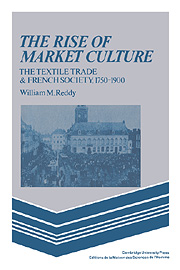Part Three - Unquestioned assumptions, 1852–1904
Published online by Cambridge University Press: 30 September 2009
Summary
The relations of capital and labor have, up to the present remained in [a] state of juridical indetermination. A contract for the hire of services occupies a very small place in our Codes, particularly when one thinks of the diversity and complexity of the relations which it is called upon to regulate. But it is not necessary to insist upon a gap which is keenly felt by all and which everybody seeks to fill.
–Emile Durkheim The Division of Labor in Society (1893)Thanks to the recent flurry of new research, the revolution of 1848 is emerging as a period of ferment among French laborers in some ways more creative than anything that has occurred since. For a while they felt self-confident; they thought they had won and that the struggle was over. Without much central leadership or planning they set about rebuilding the world of labor as they wanted it, ignoring the warning signs of impending reaction until it was too late. Never again would they be so naive; but at the same time never again would their aims be formulated with such a slim admixture of market language. In the future, escaping from the reign of the market would be relegated to the status of a dim hope. Action would be increasingly planned with an eye to manipulating market forces. Many of the socialist and union organizations that later grew up under the Third Republic encouraged such manipulation. The state accommodated it. Laws allowing for strikes and unions and facilitating collective bargaining were slowly pushed through, at first by a liberalizing Empire, later by the working class' own elected Radical and socialist representatives.
- Type
- Chapter
- Information
- The Rise of Market CultureThe Textile Trade and French Society, 1750–1900, pp. 225 - 226Publisher: Cambridge University PressPrint publication year: 1984



